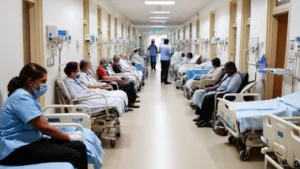Articles & News
- Inicio
- Blog
29. junio 2023
News from the Capitals
News from the Capitals #64

France
Loss of competitiveness, shortages: a new explosive aspect of the French health crisis?
France has been facing drug shortages for several years, prompting the Ministry of Health to take action. To tackle the issue, Minister of Health and Prevention François Braun and Minister Delegate for Industry Roland Lescure initiated a steering committee to develop a new strategy for preventing and managing shortages. On June 13th, the Ministry of Health and Prevention published a list of 450 essential drugs aimed at meeting the priority needs of the French population. This list was created based on input from the French Society of Anesthesiology and Intensive Care, analysis from various medical societies, and recommendations from scientific authorities and public health plans. However, the list has faced criticism from specialists in pharmacology and medical disciplines.
One aspect of concern is the process through which the list was established. The project was led by the French Society of Clinical Pharmacy with the support of OMéDIT Paca. However, there are no mentions of disclosing conflicts of interest with the pharmaceutical industry in the work of the French Society of Clinical Pharmacy. This has raised suspicions that the French Minister of Health may have been trying to favor the pharmaceutical industry with this list.
Another aspect that has been criticized remains in the selected drugs, some of them appear to be unnecessary, while others are essential and not included.
However, this controversy surrounding the list could strain relations between the French government and the pharmaceutical industry, with concerns being raised about the loss of attractiveness for drug companies in France.
One of the key issues contributing to low production in France is the lengthy administrative delays and complex regulatory processes. Even after a drug receives approval from the European Union, it must go through several stages with local regulatory authorities before it can be marketed in France. While efforts have been made to reduce procedural times, the time taken for price negotiations and publication in the Official Journal has increased significantly.
Overall, France is exporting less and less of the mature medicines it produces, and importing more and more of the innovative products it does not produce sufficiently. Manufacturers denounce the unpredictability of the regulatory context and the budgetary pressure exerted on the sector. This oft-repeated plea is intended to put pressure on the public authorities, as the mission launched by Matignon to review the mechanisms for regulating and financing healthcare products is due to deliver its conclusions in the coming weeks.
UK
NHS publishes first long-term workforce plan
The NHS published this week the first-ever long-term workforce plan that addresses the ongoing staff shortages in the NHS that have been impacting NHS capacity and the quality of care patients receive.
The NHS vacancies currently stand at 112,000 and this number is projected to grow up to 360,000 by 2037. The workforce plan, therefore, aims to act immediately by doubling medical school training places to 15,000 by 2031, increase GP training places by 50% and double the number of nurse training places by 24,000.
The plan also focused on integrating more innovative therapies and digital technologies into the NHS to support staff in working more efficiently to reduce patient waiting times in emergency and elective care.
The Sunak government’s publication of the workforce plan after months of strikes by NHS staff on capacity and pay issues and the recent Labour Party success in local elections demonstrates the government’s increased attention on the NHS, which has been a core focus in party manifestos.
Germany
German Government to Burn 755 Million Expired COVID-19 Masks
The German government plans to burn over 755 million expired COVID-19 masks at a cost of nearly seven million euros. The masks, including 660 million certified surgical masks and 95 million certified FFP2 masks, have exceeded their shelf life and will undergo an energy recovery process for disposal. The decision has sparked criticism, with politicians blaming the former Health Minister for excessive procurement and calling for a system to distribute masks before they expire. Opposition parties argue that the masks could have been provided to medical facilities instead of being destroyed, ensuring free protection for healthcare workers and patients.
German Pharmacies Adapt Opening Hours to Combat Staff Shortages
German pharmacies are being granted flexibility in their opening hours to address the ongoing staff shortages. Previously, pharmacies had fixed opening hours, but now they will have the option to determine their schedules and even close on Saturdays if they choose. This measure aims to alleviate the staffing crisis and prevent pharmacy closures. The new regulations require pharmacies to be open for a total of six hours on four weekdays between 8 am and 8 pm, with an additional three hours on another day. The pharmacy industry hopes that these flexible working hours will improve job market attractiveness and help fill vacant positions. Emergency pharmacies will continue to operate 24/7, ensuring comprehensive healthcare provision. The states of Saxony, Brandenburg, and Rhineland-Palatinate have already implemented similar flexible working hour systems.
Spain
Miñones defends the need to consolidate Precision Personalized Medicine throughout the territory “equitably.”
The Minister of Health, José Miñones, visited the Galician Public Foundation of Genomic Medicine to emphasize the importance of consolidating Precision Personalized Medicine equitably across the territory. He highlighted projects and programs aimed at individualized diagnosis and treatment, such as the IMPaCT Genomics Program. Miñones also mentioned the 5-P Plan, which focuses on genetic testing for high-impact diseases, such as rare diseases and oncological diseases, as well as for the selection and monitoring of optimal treatments and reproductive decision-making. The Minister acknowledged the Foundation’s role in advising the upcoming specialty of Genetics and expressed gratitude for their contributions.
Spanish Government Accuses Opposition Party of Politicizing EU Presidency
The Spanish Government accuses the Popular Party (PP) of trying to politicize Spain’s Presidency of the EU Council, which is unprecedented among European partners. They criticize the PP for not aligning with the government’s efforts and for rejecting participation in meetings related to the EU Presidency due to the upcoming electoral cycle. The government emphasizes that Spain does not set priorities or agenda during its Presidency, which are determined by ongoing issues within the EU. They state that the agenda has been agreed upon with European institutions and has the support of the majority of political forces and autonomous communities. The government hopes that any change in government will not lead to modifications in the agreed-upon plans and schedule. They avoid discussing the possibility of a defeat in the upcoming elections and do not clarify if there are plans for a smooth transition of responsibilities after the Presidency
Greece
Greek elections: New Democracy secures majority and the far-right enters the parliament
Greek conservative leader of the New Democracy party, Kyriakos Mitsotakis, achieved a resounding victory over his center-left opponent in the second election on 25 June. He stated that this outcome has provided him with a “strong mandate” to accelerate the pace of change. Mitsotakis’s New Democracy party secured 40.5% of the national vote, leaving Alexis Tsipras’s Syriza party trailing by nearly 23 points. In May, Mitsotakis had defeated Syriza but called for new elections to secure a majority.
Addressing his jubilant supporters in Athens, Mitsotakis declared that New Democracy is now the most influential center-right party in Europe. He was sworn in as prime minister on Monday and is credited with successfully stabilizing and reviving the Greek economy following a severe debt crisis and multiple international bailouts. Despite ongoing struggles with the cost of living, voters opted to stay with the party that promised lower taxes and improved public health.
One noteworthy aspect of the election was the success of the newly established far-right Spartans party, which secured nearly 4.7% of the vote and surpassed the 3% threshold required to enter parliament. The Spartans emerged as a political force this month after the Supreme Court banned another far-right party, the Greeks, and its incarcerated founder, Ilias Kasidiaris, threw his support behind the Spartans. Kasidiaris had previously served as the spokesperson for the neo-Nazi Golden Dawn party, which was outlawed as a criminal organization, leading to long prison sentences for its leaders. Together with the nationalist Greek Solution and the ultra-conservative Niki (Victory) parties, the three hard-right factions amassed nearly 13% of the vote and secured 34 parliamentary seats.
Turkey
Turkish government increases minimum wage again
Amid high inflation that has impacted the purchasing power of Turkish people and the dramatic devaluation of the Turkish Lira, the government announced this week another increase on the minimum wage.
Since 2018, the Turkish government has been continuously increasing the minimum wage in line with growing inflation on food and livelihood. Whilst the minimum wage was 3.198 TL in 2019, 5.000 TL in 2021, and almost 9.000 TL in 2022, Erdogan announced this week that the new minimum wage will be 22.000 TL.
It is unclear how the Turkish public will receive this news, as for years now inflation has been growing and the government has been increasing the minimum wage without any solid action plan to recover the economy.



